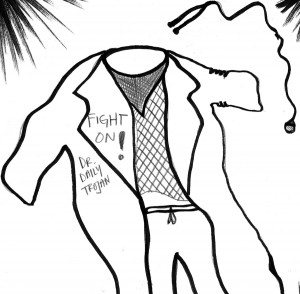Strike unlikely to have any palpable effects
The debate over workers’ rights and unions, which often receives constant attention nationwide, came to USC last month.
Workers at the Keck Medical Center of USC went on a 24-hour strike on Oct. 12 to air their grievances against the hospital, including short staffing, a potential one-year wage freeze and underwhelming benefits.
Workers have every right to organize peacefully in trade unions to address their grievances. But in the case of the Keck strike, unionization is essentially unnecessary.
Workers should not drop everything and picket if they don’t get an extra benefit.
And if they do drop everything and picket every time, they shouldn’t be able to get their jobs back.
Striking is democratic but entirely ineffective in most cases. By merely walking out on the job, workers do not generate good will for themselves.
Rather than being sympathetic figures under supposedly unfair circumstances, they appear to be the opposite.
Legal action is an effective approach to earn better rights and they rightly ended their strike after a day, choosing to pursue a compromise in a hearing on Oct. 24 before the National Labor Relation Board.
Those who went on strike were not nurses or doctors, but people who held a variety of caregiving and technical positions.
They were represented by the National Union of Healthcare Workers, an organization that arranged the strike.
Among other issues, the workers protested the small size of the staff and inadequate retirement plans or family tuition assistance as compared with employees in higher-level positions.
Those protesting their comparative lack of benefits, however, are not on the same pay scale.Thus, their level of work at the hospital does not merit the same rewards.
Those in higher-level positions have earned better rewards for their work and for the contributions they make in their place or area of work.
In addition, the strikers already received salaries that were competitive with other local hospitals.
The hospital’s NUWH employees are also some of the highest paid in the local area.
Working conditions do not have to be at an Industrial Revolution-era level to justify strikes. If workers are really being treated unjustly, they should use the legal means available to them to ameliorate the situation.
Striking, however, can be seen as just another frivolous endeavor.
A hospital is an essential institution and the workforce knows that.
One of the problems of unions became apparent with the Keck hospital workers’ strike: Some unions run on the assumption, at least partially, that everyone deserves equal pay and benefits.
Not everyone, however, deserves the exact same benefits just because they are workers. Because some workers have earned higher-level positions and they deserve better benefits.
To protest against something so simply logical in the name of labor rights gives the unionization movement, and the Keck strikers, a bad name.
Sarah Cueva is a sophomore majoring in political science. Her point runs Fridays.

